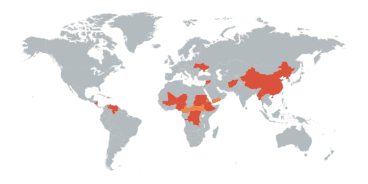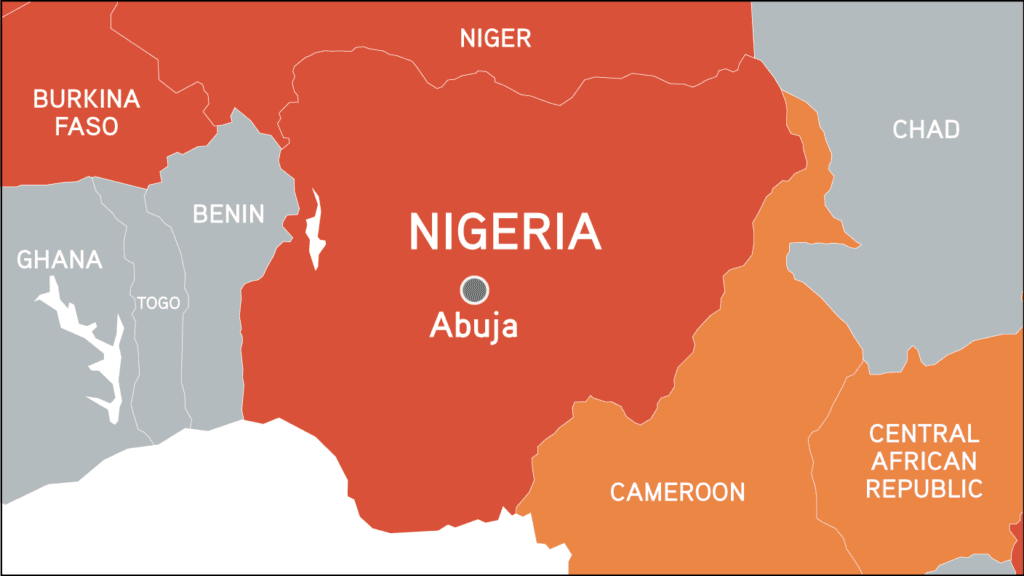
Nigeria
Attacks by armed bandit groups, as well as continued violence by Boko Haram and the Islamic State in West Africa, leave civilians in Nigeria at risk of atrocity crimes.
BACKGROUND:
For more than a decade, civilians in Nigeria have faced multiple security threats and risk of atrocities as result of attacks, kidnappings and extortion by various non-state armed groups. According to the UN Office for the Coordination of Humanitarian Affairs, the security situation has resulted in a humanitarian emergency, with more than 8.3 million people – approximately 80 percent of whom are women and children – requiring urgent assistance.
Since 2011 recurrent violence between herding and farming communities, rooted in competition over scarce resources, has escalated in central and north-west Nigeria. Largely in response to these growing tensions, armed groups and gangs, including so-called “bandits,” have formed. For years such groups have perpetrated widespread atrocities, including murder, rape, kidnapping, organized cattle-rustling and plunder. Armed bandits are also occupying vast swaths of farmland, prompting many farmers to abandon their land out of fear of attack.
In northern Nigeria, armed extremist groups, notably Boko Haram and splinter groups like the so-called Islamic State in West Africa (ISWA), have perpetrated mass atrocities against civilian and military targets. Originating in the early 2000s in the northeast, Boko Haram sought to overthrow Nigeria’s secular government and in 2009 it launched an insurgency to establish an Islamic state. Despite the African Union authorizing the Multinational Joint Task Force in 2015 to combat extremism, the threat persists. More than 35,000 people are estimated to have been killed as a result of Boko Haram attacks between 2009 and 2020. Their tactics include suicide bombings, abductions, torture, rape, forced marriages, recruitment of child soldiers and attacks against government infrastructure, traditional and religious leaders and civilians.
During counterterrorism operations, Nigerian security forces have reportedly committed human rights violations and used excessive force, including extrajudicial killings, rape, torture and arbitrary detentions against suspected Boko Haram and ISWA members, as well as civilians. The Nigerian military has allegedly run a secret, systematic and illegal abortion program in Adamawa, Borno and Yobe states that has terminated at least 10,000 pregnancies since 2013, according to an investigation by Reuters. Many of the women and girls in the abortion program had been kidnapped, forcibly married, beaten and repeatedly raped by members of Boko Haram. In attempts to curb the activities of armed bandits, the government has intensified its military operations in affected areas since late 2021, including through indiscriminate airstrikes where such groups operate that have resulted in hundreds of civilian casualties.
On 11 December 2020 the Chief Prosecutor of the International Criminal Court (ICC) announced the completion of a preliminary examination into the situation in Nigeria, concluding that there is reasonable basis to believe that Boko Haram and Nigerian security forces have committed war crimes and crimes against humanity. During an official visit to Abuja from 19-22 March 2024, the Deputy Prosecutor of the ICC and national authorities discussed the progress made to hold Boko Haram and its splinter groups, as well as members of the Nigerian Armed Forces, accountable for alleged crimes.
RECENT DEVELOPMENTS:
Since the start of 2024 civilians have faced intensified violence across Nigeria, and near-daily attacks by armed groups resulting in kidnappings and other abuses against civilians. From 23-24 January at least 30 people were killed in clashes between herder and farmer communities in several villages between the Mangu and Barkin Ladi local government areas in Plateau State. Since January at least 580 civilians have been kidnapped in incidents across several states. In two of the most significant instances, on 29 February at least 200 people, mainly women and girls, were abducted in northeastern Borno State and on 7 March armed bandits surrounded a government-owned school in the town of Kuriga, Kaduna State, and kidnapped 287 students.
On 5 April gunmen killed at least 21 villagers in Kogi State in clashes between herders and farmers. The attack was reportedly a reprisal by Fulani herders after the villagers had killed six of them three days prior.
ANALYSIS:
Nigeria’s armed forces have been deployed in two-thirds of the states in the country and are overstretched as Boko Haram, ISWA and bandit groups continue to expand their areas of operation. Smaller factions stemming from Boko Haram complicate the accurate identification of armed groups responsible for attacks, posing ongoing challenges to respond effectively to threats against civilians.
Over the past several years, Nigeria’s military has perpetrated deadly and erroneous airstrikes. Such indiscriminate airstrikes raise concerns about the military’s identification of legitimate targets and disregard for civilian casualties. While the authorities have issued apologies and acknowledged responsibility, minimal steps have been taken to seek justice or accountability or to ensure military operations minimize civilian harm.
Violence between herders and farmers has increased over the past decade as population growth has led to an expansion of the area dedicated to farming, leaving less land available for open grazing by nomads’ cattle. In Nigeria’s Middle Belt states, the majority Muslim north meets the predominantly Christian south. Competition over land use is particularly intractable in this area as the fault lines between farmers and herders often overlap with ethnic and religious divisions. Climate change and increasing desertification in the north has also exacerbated tensions as the loss of grazing land has driven many ethnic Fulani herdsmen southward into areas farmed by settled communities that are predominantly Christian. While armed bandit groups are motivated largely by criminal motives, many bandits are ethnic Fulani and prey on settled farming communities, exacerbating existing ethnic tensions. The Boko Haram insurgency in the northeast has compounded these challenges by driving herders into the Middle Belt.
RISK ASSESSMENT:
-
- Patterns of violence against civilians, or members of an identifiable group based on their ethnicity or religion, as well as their property, livelihoods and cultural or religious symbols.
- Multiple security crises caused by a proliferation of armed groups, criminal gangs and armed extremist groups.
- Climate and weather extremes causing increased competition over and exploitation of scarce resources.
- Increased politicization of identity, past events or motives to engage in violence.
- Lack of awareness and training on International Human Rights Law (IHRL) and International Humanitarian Law (IHL) for military forces, irregular forces and non-state armed groups.
NECESSARY ACTION:
While the lack of adequate military protection for vulnerable populations needs to be urgently addressed, social initiatives and political reforms remain crucial for confronting the root causes of conflict, including poor governance, corruption, poverty, youth unemployment, environmental degradation and climate change. Local peace commissions established to mediate inter-communal tensions and build early warning systems, such as those in Adamawa, Kaduna and Plateau states, need to be duplicated in other high-risk regions. The federal government and state authorities must improve coordination to develop a common strategy that addresses ongoing protection issues.
Utilizing the Economic Community of West African States’ Early Warning System, the government should increase police and military deployments to vulnerable areas while ensuring strict adherence to IHL and IHRL during operations. The government also needs to urgently reform the security sector, including by incorporating IHL and IHRL into all military and police training, and ensure accountability for human rights violations.
The government of Nigeria needs to investigate all attacks against civilians and hold perpetrators of atrocity crimes accountable. The Chief Prosecutor of the ICC must immediately request authorization to open an investigation into alleged crimes committed by armed extremist groups and government security forces.
Related Content


Atrocity Alert Special Issue: Children and Armed Conflict


